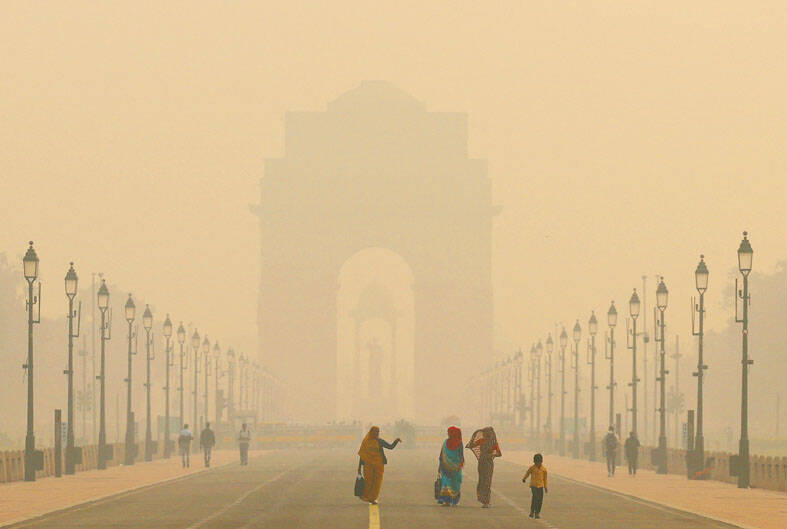Cars older than 15 years old would soon be barred from refueling in New Delhi, the city’s government said on Saturday, as part of measures to reduce the Indian capital’s hazardous pollution levels.
New Delhi is regularly ranked as one of the most polluted cities in the world and is blanketed in acrid smog each year.
The pollution is primarily blamed on agricultural burning by nearby farmers to clear their fields for ploughing, as well as factories and traffic fumes.

Photo: Reuters
Cooler temperatures and slow-moving winds worsen the situation by trapping deadly pollutants each winter.
Diesel and petrol cars older than 10 and 15 years respectively are not allowed to ply on Delhi roads, but many have been found flouting the rules.
Delhi’s environment minister Manjinder Singh Sirsa told reporters on Saturday that the decision to stop fuel for the old cars was made at a “marathon meeting” on air pollution to “find out the diseases and its remedies.”
“We have decided to stop giving fuel to vehicles more than 15 years old after March 31, 2025,” he said.
“Gadgets” would be installed at petrol pumps to identify such vehicles, he said, adding that other decisions taken include turning barren land into “new forests” and getting university students involved in planting.
The government would make it mandatory for high rises, hotels and Delhi airport to install anti-smog guns and gadgets to control pollution, he said.
The public health crisis has grown steadily worse over the years and weeks-long school closures across the capital, aimed at shielding vulnerable children from the harmful air, are now an annual occurrence.
At the peak of the smog, levels of PM2.5 pollutants — dangerous cancer-causing microparticles small enough to enter the bloodstream through the lungs — surged to more than 60 times the WHO’s recommended daily maximum.

MONEY GRAB: People were rushing to collect bills scattered on the ground after the plane transporting money crashed, which an official said hindered rescue efforts A cargo plane carrying money on Friday crashed near Bolivia’s capital, damaging about a dozen vehicles on highway, scattering bills on the ground and leaving at least 15 people dead and others injured, an official said. Bolivian Minister of Defense Marcelo Salinas said the Hercules C-130 plane was transporting newly printed Bolivian currency when it “landed and veered off the runway” at an airport in El Alto, a city adjacent to La Paz, before ending up in a nearby field. Firefighters managed to put out the flames that engulfed the aircraft. Fire chief Pavel Tovar said at least 15 people died, but

South Korea would soon no longer be one of the few countries where Google Maps does not work properly, after its security-conscious government reversed a two-decade stance to approve the export of high-precision map data to overseas servers. The approval was made “on the condition that strict security requirements are met,” the South Korean Ministry of Land, Infrastructure and Transport said. Those conditions include blurring military and other sensitive security-related facilities, as well as restricting longitude and latitude coordinates for South Korean territory on products such as Google Maps and Google Earth, it said. The decision is expected to hurt Naver and Kakao

THE TRAGEDY OF PUNCH: Footage of the seven-month-old Japanese macaque has gone viral online after he was rejected by his mother and formed a bond with a soft toy A baby monkey in Japan has captured hearts around the world after videos of him being bullied by other monkeys and rejected by his mother went viral last week. Punch, a Japanese macaque, was born in July last year at Ichikawa City Zoo. He has drawn international attention after zookeepers gave him a stuffed orangutan toy after he was abandoned by his mother. Without maternal guidance to help him integrate, Punch has turned to the toy for comfort. He has been filmed multiple times being dragged and chased by older Japanese macaques inside the enclosure. Early clips showed him wandering alone with

Australian Prime Minister Anthony Albanese yesterday said he did not take his security for granted, after he was evacuated from his residence for several hours following a bomb threat sent to a Chinese dance group. Albanese was evacuated from his Canberra residence late on Tuesday following the threat, and returned a few hours later after nothing suspicious was found. The bomb scare was among several e-mails threatening Albanese sent to a representative of Shen Yun, a classical Chinese dance troupe banned in China that is due to perform in Australia this month, a spokesperson for the group said in a statement. The e-mail